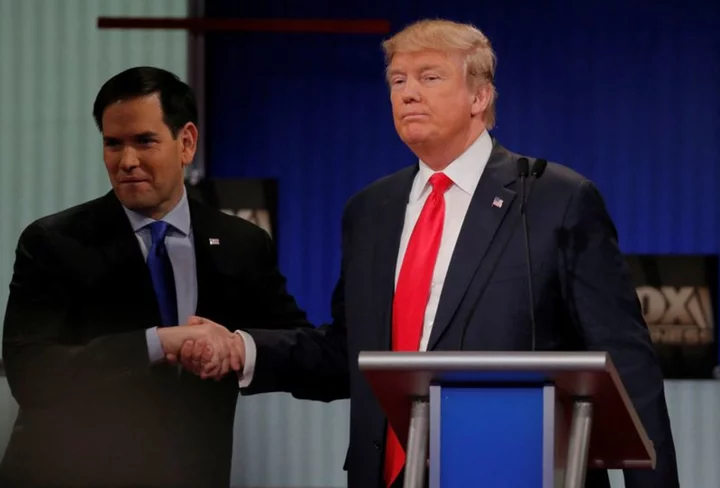By Blake Brittain
WASHINGTON The U.S. Supreme Court on Monday agreed to consider whether a California attorney's federal trademark for the phrase "Trump Too Small" - a cheeky criticism of former President Donald Trump - should have been granted.
The justices took up an appeal by the U.S. Trademark Office of a lower court's decision that trademark applicant Steve Elster's free speech protections under the U.S. Constitution's First Amendment for his criticism of public figures outweighed the government agency's concerns about Trump's rights.
Elster applied for the "Trump Too Small" trademark in 2018 to use on shirts. Elster said the mark was inspired by an exchange between Trump and U.S. Senator Marco Rubio from a March 2016 presidential candidate debate and aims to "convey that some features of President Trump and his policies are diminutive."
In legal papers, Elster cited remarks including Rubio's about the size of "certain parts of (Trump's) anatomy, such as his hands" and news articles about the former president's "Shrinking of America" and reduction of national monuments.
After the trademark office rejected Elster's application, an in-house tribunal at the agency upheld that decision, citing a federal law that bars trademarks that use a person's name without his or her consent. The U.S. Court of Appeals for the Federal Circuit reversed the ruling last year, allowing the trademark.
"The government has no legitimate interest in protecting the privacy of President Trump, the least private name in American life," and the right of publicity "cannot shield public figures from criticism," Circuit Judge Timothy Dyk wrote in that decision.
Dyk also said the case did not implicate Trump's publicity rights, which protect a person's use of their name in commerce, because there were no allegations that Elster was exploiting the commercial value of the former president's name or implying he endorsed the shirts.
"The right of publicity cannot shield public figures from criticism," Dyk said.
Trump, who is the frontrunner for the 2024 Republican presidential nomination as he seeks to return to the White House, is not personally involved in the case.
Trump and Rubio, a senator from Florida, were rivals for the 2016 Republican presidential nomination - a prize eventually won by the businessman-turned-politician. Trump during the campaign sought to denigrate Rubio by calling him "Little Marco."
At a campaign rally in Virginia, Rubio picked up on this theme, noting that while Trump was taller than him his rival had proportionally small hands.
"And you know what they say about guys with small hands," Rubio said as the audience laughed. "You can't trust them."
At the subsequent candidate debate, Trump defended himself.
"He hit my hands. Nobody has ever hit my hands," Trump said of Rubio. "I've never heard of this one. Look at those hands. Are they small hands? And he referred to my hands. If they're small, something else must be small. I guarantee you, there's no problem. I guarantee it."
"OK, moving on," said debate moderator Bret Baier of Fox News, quickly steering the debate toward another subject.
Trump did not specify the "something else" to which he was referring.
The Trademark Office, represented by President Joe Biden's Justice Department, pushed back against concerns about discouraging political speech in its petition for the Supreme Court to hear the matter.
"To the contrary, it is the registration of marks like respondent's - not the refusal to register them - that would 'chill' such speech," the trademark office said. "After all, a trademark gives its owner the right to prevent others from using the mark."
The Supreme Court is due to hear the case during its next term, which begins in October.
The court previously favored First Amendment rights over federal trademark restrictions in a 2017 ruling in favor of an Asian-American rock band called The Slants and a 2019 decision in favor of artist Erik Brunetti's "FUCT" brand.
(Reporting by Blake Brittain in Washington; Additional reporting by Andrew Chung in New York; Editing by Will Dunham)

